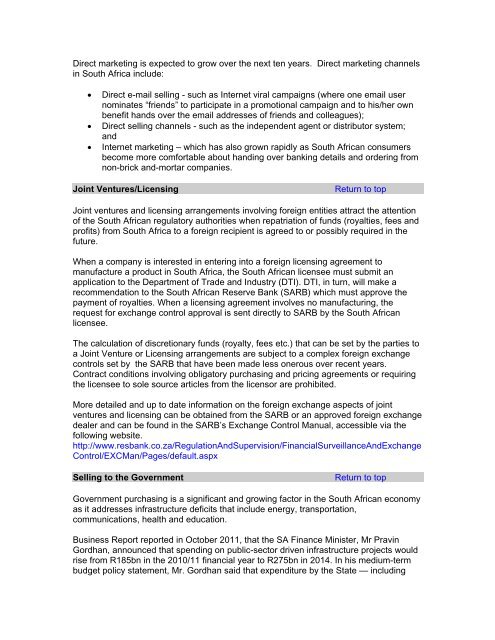South Africa - International Franchise Association
South Africa - International Franchise Association
South Africa - International Franchise Association
You also want an ePaper? Increase the reach of your titles
YUMPU automatically turns print PDFs into web optimized ePapers that Google loves.
Direct marketing is expected to grow over the next ten years. Direct marketing channels<br />
in <strong>South</strong> <strong>Africa</strong> include:<br />
• Direct e-mail selling - such as Internet viral campaigns (where one email user<br />
nominates “friends” to participate in a promotional campaign and to his/her own<br />
benefit hands over the email addresses of friends and colleagues);<br />
• Direct selling channels - such as the independent agent or distributor system;<br />
and<br />
• Internet marketing – which has also grown rapidly as <strong>South</strong> <strong>Africa</strong>n consumers<br />
become more comfortable about handing over banking details and ordering from<br />
non-brick and-mortar companies.<br />
Joint Ventures/Licensing Return to top<br />
Joint ventures and licensing arrangements involving foreign entities attract the attention<br />
of the <strong>South</strong> <strong>Africa</strong>n regulatory authorities when repatriation of funds (royalties, fees and<br />
profits) from <strong>South</strong> <strong>Africa</strong> to a foreign recipient is agreed to or possibly required in the<br />
future.<br />
When a company is interested in entering into a foreign licensing agreement to<br />
manufacture a product in <strong>South</strong> <strong>Africa</strong>, the <strong>South</strong> <strong>Africa</strong>n licensee must submit an<br />
application to the Department of Trade and Industry (DTI). DTI, in turn, will make a<br />
recommendation to the <strong>South</strong> <strong>Africa</strong>n Reserve Bank (SARB) which must approve the<br />
payment of royalties. When a licensing agreement involves no manufacturing, the<br />
request for exchange control approval is sent directly to SARB by the <strong>South</strong> <strong>Africa</strong>n<br />
licensee.<br />
The calculation of discretionary funds (royalty, fees etc.) that can be set by the parties to<br />
a Joint Venture or Licensing arrangements are subject to a complex foreign exchange<br />
controls set by the SARB that have been made less onerous over recent years.<br />
Contract conditions involving obligatory purchasing and pricing agreements or requiring<br />
the licensee to sole source articles from the licensor are prohibited.<br />
More detailed and up to date information on the foreign exchange aspects of joint<br />
ventures and licensing can be obtained from the SARB or an approved foreign exchange<br />
dealer and can be found in the SARB’s Exchange Control Manual, accessible via the<br />
following website.<br />
http://www.resbank.co.za/RegulationAndSupervision/FinancialSurveillanceAndExchange<br />
Control/EXCMan/Pages/default.aspx<br />
Selling to the Government Return to top<br />
Government purchasing is a significant and growing factor in the <strong>South</strong> <strong>Africa</strong>n economy<br />
as it addresses infrastructure deficits that include energy, transportation,<br />
communications, health and education.<br />
Business Report reported in October 2011, that the SA Finance Minister, Mr Pravin<br />
Gordhan, announced that spending on public-sector driven infrastructure projects would<br />
rise from R185bn in the 2010/11 financial year to R275bn in 2014. In his medium-term<br />
budget policy statement, Mr. Gordhan said that expenditure by the State — including
















